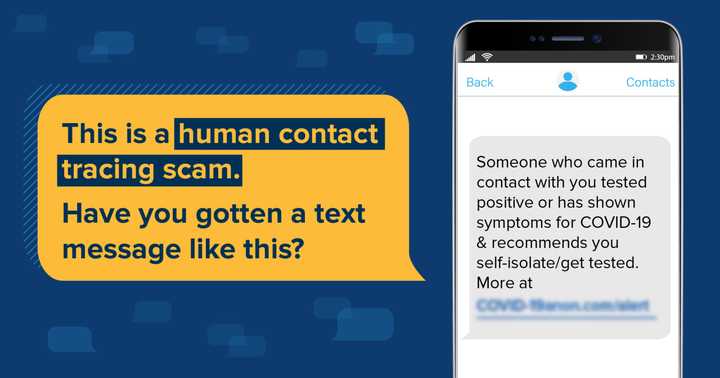Since the outbreak began, state officials have stressed the importance of ramping up COVID-19 testing, then tracing the people they’ve come into contact with, and isolating those people.
According to the Centers for Disease Control and Prevention, “contact tracing, a core disease control measure employed by local and state health department personnel for decades, is a key strategy for preventing further spread of COVID-19.
“Communities must scale up and train a large contact tracer workforce and work collaboratively across public and private agencies to stop the transmission of COVID-19.”
However, the pandemic has given scammers the opportunity to pose as phony tracers, the Federal Trade Commission warned.
Contact tracers are usually hired by a state’s department of public health, working with an infected person to get the names and phone numbers for everyone that infected person came in close contact with while possibly infectious.
Those names and phone numbers are often kept in an online system.
People who had contact with someone infected with COVID-19 may first get a text message from the health department, telling them they’ll get a call from a specific number, according to the FTC. The tracer who calls will not ask for personal information, like Social Security, credit card, or banking numbers.
At the end of the call, some states ask if the contact would like to enroll in a text message program, which sends daily health and safety reminders until the 14-day quarantine ends.
According to the FTC, tracers won’t ask for money or information. Anyone who does that is a scammer.
“There’s no question, contact tracing plays a vital role in helping to stop the spread of COVID-19,” the FTC noted. “But scammers, pretending to be contact tracers and taking advantage of how the process works, are also sending text messages.
“But theirs are spam text messages that ask you to click a link (see image above). Unlike a legitimate text message from a health department, which only wants to let you know they’ll be calling, this message includes a link to click.”
Here are several other steps you can take to protect yourself from text scammers, from the FTC:
- Protect your online accounts by using multi-factor authentication. It requires two or more credentials to log in to your account, which makes it harder for scammers to log in to your accounts if they do get your username and password;
- Enable auto-updates for the operating systems on your electronic devices. Make sure your apps also auto-update so you get the latest security patches that can protect from malware;
- Back up the data on your devices regularly, so you won’t lose valuable information if a device gets malware or ransomware.
Click here to follow Daily Voice Beekman-Poughquag and receive free news updates.
